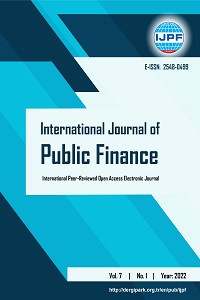Impact of Fiscal Decentralization on Local Autonomy in the Sudan: Experience of Gadarif State
Based on state data of the periods (1997-2012), this study aimed at evaluating the fiscal decentralization experience of Gadarif state of eastern Sudan in the context of different aspects of fiscal decentralization, namely expenditure assignment, revenue assignment and intergovernmental transfers. To accomplish these objectives, many local fiscal indicators have been calculated, and parameters of regressions of both revenues and expenditures have been estimated. The results reveal that the experience of fiscal decentralization of the state came out with poor fiscal situations indicated by higher dependence on the federal transfers and higher vertical imbalance and consequently the failure of the state government to perform its responsibilities of delivering the basic services to its constituents. Moreover, none of both local expenditure neither local revenues respond to federal transfers, indicating the failure of these
Anahtar Kelimeler:
: fiscal decentralization, expenditure and revenue Assignment, local autonomy
Impact of Fiscal Decentralization on Local Autonomy in the Sudan: Experience of Gadarif State
Based on state data of the periods (1997-2012), this study aimed at evaluating the fiscal decentralization experience of Gadarif state of eastern Sudan in the context of different aspects of fiscal decentralization, namely expenditure assignment, revenue assignment and intergovernmental transfers. To accomplish these objectives, many local fiscal indicators have been calculated, and parameters of regressions of both revenues and expenditures have been estimated. The results reveal that the experience of fiscal decentralization of the state came out with poor fiscal situations indicated by higher dependence on the federal transfers and higher vertical imbalance and consequently the failure of the state government to perform its responsibilities of delivering the basic services to its constituents. Moreover, none of both local expenditure neither local revenues respond to federal transfers, indicating the failure of these
Keywords:
Fiscal Decentralization Expenditure And Revenue Assignment, Local Autonomy, Federal Transfers,
___
- References Ali, Ali Abdelgadir (2007): Intergovernmental Transfers in Sudan: A proposed approach for Horizontal Distribution, UNICONS, Khartoum Sudan 2007, un published research.Bell, Michael E and Ahmed, Medani M (2005) " Fiscal Decentralization in the Sudan: Concepts and Challenges" George Washington Institute of Public Policy, the George Washington University, Working Paper No 10. Bessie, Melkamo (2004) “Fiscal Decentralization in Benishangul Gumoz Region: A review of Problems of Fiscal imbalance” un published MSc. thesis in University of Addis Ababa.Comprehensive Peace Agreement, 2005de Mello, Luiz R. (2000) “Fiscal Decentralization and Intergovernmental Fiscal Relations: A Cross-Country Analysis”World Development,Vol. 28, No. 2Elbadawi, Ibrahim and Kabbashi Suliman (2008) “Toward an Equitable Intergovernmental Transfer System for the Sudan” in Abdelrahman, Saif eldin D, ed.: Generating Growth and Making Fiscal Decentralization Works in Post-Conflict Sudan – Ministry of Finance and National Economy, Sudan. Elbattahani, Atta (2008) "Fiscal Federalism and Institutional Development: Analyzing the Conundrum of De-centering the Centre in Post Conflict Sudan" in Abdelrahman, Saif eldin D, ed.: Generating Growth and Making Fiscal Decentralization Works in Post-Conflict Sudan – Ministry of Finance and National Economy, Sudan. _________and Gadkarim (2017): Governance and Fiscal Federalism in Sudan, 1989–2015: Exploring Political and Intergovernmental Fiscal Relations in an Stable Policy, University of Bergen, CMIElshibly, M. Medani (1990) “Fiscal Federalism in Sudan” Khartoum University Press_____________(2013) Fiscal Transfers: Towards a Pro-poor System, Assessment of the existing Inter-Governmental Fiscal Transfers System in Sudan. UN, Country Office SudanGangi, Yagoub and Ibrahim, Gamal (2008) "Institutionalist Perspective on Decentralization in Sudan" in Abdelrahman, Saif Eldin, ed. " Generating Growth and Making Fiscal Decentralization Work in Post-Conflict Sudan" Ministry of Finance and National Economy, Sudan. Mohamed, Sharif Ismail (2017): Restructuring Intergovernmental Fiscal Relations to Enhance Growth and Development in Post-Secession Sudan, Journal of Public Economics and Finance, December 2017, Vol. 4, No 1 Musgrave, Richard A and Peggy B. Musgrave (1984) ““Fiscal Decentralization and” McGraw-Hill New York. Oates, Wallace (1999) “An Essay on Fiscal Federalism” Journal of Economic Literature Vol. 37________ (1972) “Fiscal Federalism” Harcourt, Jovanovich Sagbas, Isa (2001) “An Econometric Analysis of Local Fiscal Response to Revenue Sharing in Turkey” Economic and Planning Council: Government and Policy, Volume 19Shah, Anwar (2004) “Fiscal Decentralization in Developing and Transition Economies: Progress, Problems, and the Promise” World Bank Policy Research Working Paper No.3282________ (1997) “Balance, Accountability, and Responsiveness: Lessons about Decentralization” World Bank Conference on Evaluation and Development, April 1-2 Tiebout, Charles M. (1956) “A Pure Theory of Local Expenditure” Journal of Political Economics, No. 5Vazquez, Jorge Martinez and Robert M. McNab “Fiscal Decentralization and Economic Growth” International Studies Program - Working paper No. 01-
- Yayın Aralığı: Yılda 2 Sayı
- Başlangıç: 2016
- Yayıncı: Adnan GERÇEK
Sayıdaki Diğer Makaleler
Unionization and Labor Share of Income Distribution: An Empirical Investigation of OECD Countries
Sacit Hadi AKDEDE, Sidre G.b. GÖCEKLİ
VAT Liabilities of Electronic Service Providers in Turkey
Erdem ATEŞAĞAOĞLU, Süheyl KARAKAYA
Paul ONYANGO-DELEWA, İsaac NABETA NKOTE
OECD Ülkelerinde Genişletici Maliye Politikalarının Ekonomik Büyüme Üzerine Etkisi
Tax System and Rates in the Republic Of Kosovo and Their Comparison with the Balkan Countries
Doğal Afet Önlemlerinin Politik Ekonomisi
Impact of Fiscal Decentralization on Local Autonomy in the Sudan: Experience of Gadarif State
